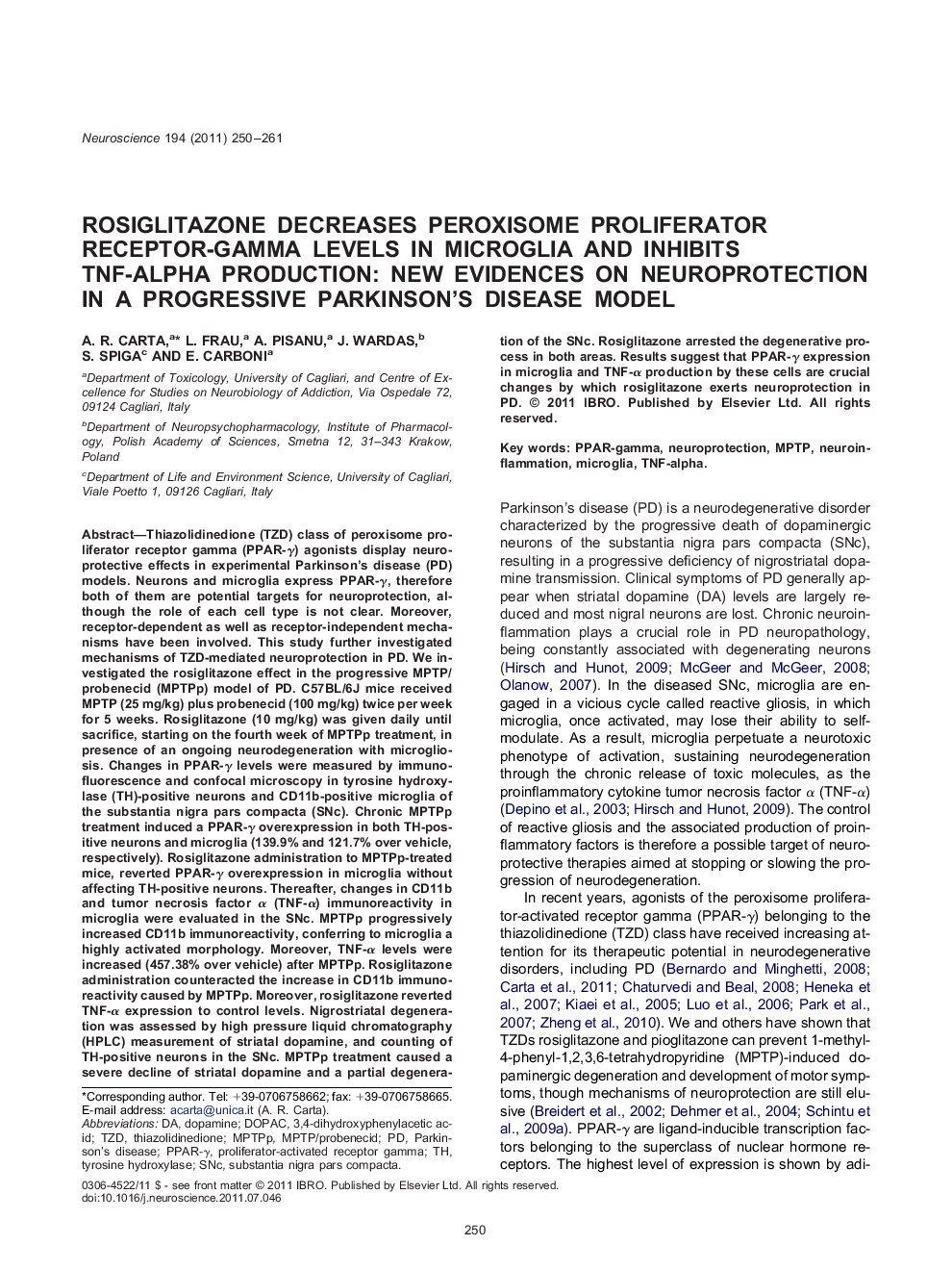| کد مقاله | کد نشریه | سال انتشار | مقاله انگلیسی | نسخه تمام متن |
|---|---|---|---|---|
| 4338816 | 1614882 | 2011 | 12 صفحه PDF | دانلود رایگان |

Thiazolidinedione (TZD) class of peroxisome proliferator receptor gamma (PPAR-γ) agonists display neuroprotective effects in experimental Parkinson's disease (PD) models. Neurons and microglia express PPAR-γ, therefore both of them are potential targets for neuroprotection, although the role of each cell type is not clear. Moreover, receptor-dependent as well as receptor-independent mechanisms have been involved. This study further investigated mechanisms of TZD-mediated neuroprotection in PD. We investigated the rosiglitazone effect in the progressive MPTP/probenecid (MPTPp) model of PD. C57BL/6J mice received MPTP (25 mg/kg) plus probenecid (100 mg/kg) twice per week for 5 weeks. Rosiglitazone (10 mg/kg) was given daily until sacrifice, starting on the fourth week of MPTPp treatment, in presence of an ongoing neurodegeneration with microgliosis. Changes in PPAR-γ levels were measured by immunofluorescence and confocal microscopy in tyrosine hydroxylase (TH)-positive neurons and CD11b-positive microglia of the substantia nigra pars compacta (SNc). Chronic MPTPp treatment induced a PPAR-γ overexpression in both TH-positive neurons and microglia (139.9% and 121.7% over vehicle, respectively). Rosiglitazone administration to MPTPp-treated mice, reverted PPAR-γ overexpression in microglia without affecting TH-positive neurons. Thereafter, changes in CD11b and tumor necrosis factor α (TNF-α) immunoreactivity in microglia were evaluated in the SNc. MPTPp progressively increased CD11b immunoreactivity, conferring to microglia a highly activated morphology. Moreover, TNF-α levels were increased (457.38% over vehicle) after MPTPp. Rosiglitazone administration counteracted the increase in CD11b immunoreactivity caused by MPTPp. Moreover, rosiglitazone reverted TNF-α expression to control levels. Nigrostriatal degeneration was assessed by high pressure liquid chromatography (HPLC) measurement of striatal dopamine, and counting of TH-positive neurons in the SNc. MPTPp treatment caused a severe decline of striatal dopamine and a partial degeneration of the SNc. Rosiglitazone arrested the degenerative process in both areas. Results suggest that PPAR-γ expression in microglia and TNF-α production by these cells are crucial changes by which rosiglitazone exerts neuroprotection in PD.
▶PPAR-γ agonist rosiglitazone specifically changed PPAR-γ levels in microglia, leaving unaltered neuronal receptors, in a model of progressive PD. ▶Rosiglitazone inhibited TNF-α production by microglia. ▶Rosiglitazone arrested ongoing neuroinflammation and degeneration of nigral dopamine neurons. ▶Microglial PPAR-γ and TNF-α production are main targets in rosiglitazone-mediated neuroprotection in PD.
Journal: Neuroscience - Volume 194, 27 October 2011, Pages 250–261